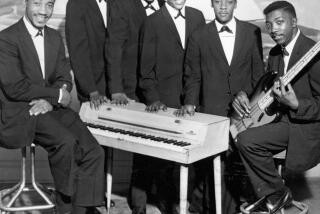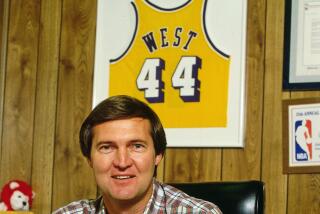COMMENTARY : Reggie Williams Falls a Long Way
- Share via
What happened to Reggie Williams?
How did a question mark come to be placed at the end of his name?
What went wrong? And why?
How did this headline player end up in the small type, under transactions--Reggie Williams, waived--as if he were just another guy?
When he played for Dunbar High in Baltimore, he was the best player on the best high school team in Baltimore history. In 1983, the Poets were No. 1 in America.
He was an All-American at Georgetown, and the heart of a team of overachievers who made it to the NCAA tournament final eight in the post-Patrick Ewing era. There was no play too big, no moment too pressured, for him to handle, and, as a bonus, he did it with a stylish grace, too.
This is how good he was: Williams was the fourth player chosen in the 1987 NBA draft. He was destined, by God, to be the next George Gervin, and don’t let anyone tell you otherwise.
What happened to that Reggie Williams?
We don’t have any answers, but we do have a few clues. And they are not particularly heartening either. The clues are bad attitude, a distorted work ethic and, perhaps the worst of his crimes, the inability to hit the jump shot. Three seasons into a career gone wrong, Williams was waived by the Cleveland Cavaliers, to be replaced -- get this -- by Paul Mokeski, just so you understand the degree of injury involved.
Could the pro scouts have been so wrong?
Was he too slow? Too thin? Was he overrated as a shooter? Is it possible there is only one George Gervin?
A more important question might be this: Could all those who knew Reggie Williams growing up have been so wrong?
What are we to think when Wayne Embry, general manager of the Cleveland Cavaliers, relates this conversation to us: “I suggested to Reggie that he go back and look at films of how he was good in college, and try to pick it up again”?
What are we to think when we learn that Williams, in his time in Cleveland, was most often last to practice and first to leave?
“I don’t know what to think,” says Leon Howard, who has known Williams since he was 8 years old and who coached Williams in recreation-league play. “That can’t be the Reggie I know.”
Howard says the Reggie Williams he knows was the one who worked the hardest, who wanted the most to win, who was the most reliable, who cared more than anyone.
“He’s a loner,” Howard says. “Maybe because he doesn’t sit around and laugh with the guys, especially after a loss, maybe they think he doesn’t care. I can’t believe he doesn’t. The Reggie Williams I know never had a bad attitude about basketball. When you get a reputation, it’s hard to overcome.”
But from all accounts, and from two professional teams, Williams had enough bad attitude to cost him his job, and maybe his career.
What happened to Reggie Williams?
From Georgetown, he went to the Los Angeles Clippers, the Bermuda Triangle of professional basketball. Whatever can go wrong in your career there usually does. In most cases, it is a career-threatening injury. For Williams, it began with a poor shooting percentage and proceeded rapidly downhill. He lost the starting job on a last-place team and, from all accounts, pouted. That happens. This does not: With 30 seconds to go in one game, he refused to take the floor. He was suspended, and a dark cloud began gathering.
The Clippers did not trade him right away. They thought he could be salvaged, but he never played up to his reputation, and, finally, last Nov. 16, after two-plus seasons, he was sent to Cleveland along with the rights to Danny Ferry in exchange for Ron Harper and three draft picks. The trade was a large gamble for the Cavaliers, and part of the gamble was that Williams could take Harper’s place.
There is no better definition of second chance than this. Didn’t Williams understand?
Cavalier Coach Lenny Wilkens was, like John Thompson, who coached Williams at Georgetown, a Providence alumnus. It was probably at Thompson’s suggestion the Cavaliers took a shot at Williams in the first place. Little things like suspensions do not simply go away.
But, according to those in Cleveland, Williams’ attitude never improved. He played 32 games, 12 of which he started, averaging less than seven points and shooting 38 percent. He did not make his mark, except in meetings with Embry and Wilkens to discuss what they like to call in pro basketball work ethic. They used to make jokes about work ethic in the NBA. No longer. It isn’t enough to be talented. You have to want it.
Did Williams want it badly enough or did he simply give up?
Did he believe too much in his notices?
Did he have a real understanding of what could happen if he didn’t perform?
Did he ever hear the letters: CBA?
These are questions many people who know Williams are asking, and questions Williams should be asking himself.
Here are two more: What happened to Reggie Williams? And is it too late to fix whatever went wrong?
More to Read
Go beyond the scoreboard
Get the latest on L.A.'s teams in the daily Sports Report newsletter.
You may occasionally receive promotional content from the Los Angeles Times.










